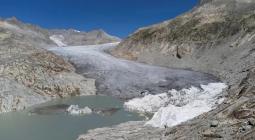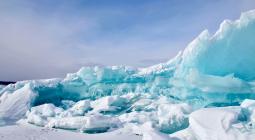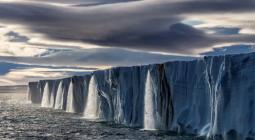As Glaciers Melt, the Earth’s Cryosphere Is on Thin Ice
A glaciologist and climate scientist is sounding the alarm at COP30 about the rapid shrinking of glaciers all over the world, setting the stage for flooding, sea level rise and mass migration.
Scientists attending the 30th United Nations climate conference in Brazil are highlighting the alarming state of the cryosphere, the frozen part of Earth covered in ice, snow and permafrost.
A recent report by the International Cryosphere Climate Initiative warns that “the European Alps, Rockies of the Western U.S. and Canada, Iceland, and Scandinavia would lose nearly all ice at 2 degrees Celsius of warming.” And we’re on track for more than that at this point.
Miriam Jackson is a glaciologist, climate scientist and the Eurasia and Nordic director of the International Cryosphere Climate Initiative, speaking from COP30 in Brazil. This interview has been edited for length and clarity.
PALOMA BELTRAN: You just had a presentation at the COP30 climate talks about the cryosphere. What is the current state of the cryosphere?
MIRIAM JACKSON: Yes, I’ve just given a presentation on tropical glaciers, the ones at low latitudes in Peru, Bolivia, Ecuador and Africa. They’re responding very quickly to climate change. They’re at high elevation, and they’re a little bit different than other glaciers, because they get snow at any time of the year, and they can melt at any time of the year. And they’re changing very quickly, more quickly than the global average.
Glaciers all over the world are changing fast—some areas faster than others. For example, the European Alps; the glaciers are changing very fast in parts of Norway, especially northern Norway, on Svalbard, at very high northerly latitudes.
What we’re seeing now is something very similar over the whole world, that all the different glaciers—the ones at very high latitudes close to the North Pole, the ones at very high elevation close to the equator, the ones on high mountains in Asia—they are all changing. Some of them are changing quite slowly, and some are changing quite fast.
Since 2000, many of them have lost 20 percent of their mass, some of them even more, and that’s a huge amount, to lose that much mass in just over 20 years. That’s not sustainable. At that rate, many glaciers are going to disappear very soon. Some have already disappeared; Venezuela and Slovenia lost their last glaciers quite recently. This isn’t something that we’re saying, “This is going to happen.” This is already happening.
BELTRAN: What are some of the impacts of melting glaciers on surrounding communities, and on the world as a whole?
JACKSON: We’re seeing many different impacts from melting glaciers. The most immediate is for people, especially in high mountain areas, who use the water for melting glaciers for water supply. A lot of people in Hindu Kush Himalaya are very dependent on glaciers for meltwater, for agriculture, for hydropower, for tourism and also for spiritual reasons.
Glaciers mean so much to so many people. This is affecting monk communities the most, and also affecting a lot of people downstream who might live far from the glaciers. Especially in arid regions, certain parts of Central Asia and northern Pakistan, it’s very dry. They depend on water from glaciers, and also water from snow, and they’re really seeing changes now, or they’re going to see them very soon.
Glaciers will affect the sea level because even though the mountain glaciers are small, they’re already causing a sea level rise. This affects everybody living in coastal communities, or on low-lying islands.
BELTRAN: What are glaciologists and cryosphere researchers pushing for at COP30?
JACKSON: We’re here for a few different reasons. We’re trying to communicate information about the cryosphere, the different ways the changes in glaciers are affecting us. It’s changes in water supply, it’s hazards like floods, it’s sea level rise.
We’re trying to make sure that the negotiators understand the science, that they have the facts, that they have the language they need. We’re working hard to get it in the text, and sometimes we do see that people in some parts of the world are thinking, “Why are we interested in sea ice? This doesn’t affect us. You know, we’re not in the Arctic, sea ice doesn’t affect us.”
Changes in sea ice affect everybody, because this affects the albedo of the Earth. As we lose sea ice, the Earth gets warmer even faster. … We will fight if necessary to keep it in the text, because there’s always a lot of discussion on what should and shouldn’t be in the text.
BELTRAN: You’re currently at COP30 in Belém, Brazil, where these climate negotiations are taking place. What are the sentiments there?
JACKSON: The sentiments here vary quite a lot. Countries like Tajikistan, Nepal and Bhutan are really seeing the effects now of changes in the glaciers. They might have seen deaths from these glacial outburst floods, or they might be seeing other floods that are caused by sudden rain on the snow. They’re very concerned.
“There’s no point in continuing to make money if the whole world is struggling so much with climate change that nobody’s interested in buying oil anymore, they’re just interested in survival.”
Low-lying island states have a coalition, and they’re very concerned as well, because, as they say, they’ve contributed the least to climate change but they’re some of the ones who are suffering the most, and some of these islands are very low lying. They’re thinking, “Will we even still be here by the end of the century?” They really feel the urgency.
There are a lot of countries here who export oil, and a lot of them are quite reluctant to see the urgency. Obviously, their countries make a lot of money from exporting oil, so they want to keep on. I think they don’t really understand that this is going to affect everyone. There’s no point in continuing to make money if the whole world is struggling so much with climate change that nobody’s interested in buying oil anymore, they’re just interested in survival.
So it is frustrating here, and for some people, this is existential because of disruptions globally. We have disruptions in trade. We have more people migrating because where they live, they can no longer survive. So globally, it’s going to affect everybody.
It is very hard trying to communicate this to some of the countries who possibly aren’t immediately affected, but will be in the long run. But we keep on trying.
Cover photo: People observe the Rhone Glacier as it melts into its glacial lake in the Swiss Alps. Credit: Fabrice Coffrini/AFP via Getty Images




